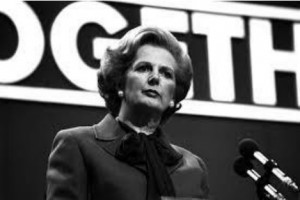The life and legacy of a great leader and masterful communicator. There is no doubt by now that Baroness Thatcher was one of the greats. It is no accident that she was afforded the same send-off today that the nation gave Sir Winston Churchill. On the occasion of her passing from this world, we examine her leadership and skills as a communicator. As a leader, she was interested in ideas and had a very clear vision which she articulated clearly and with gravitas. Not only that but as she developed her style she did it with warmth and humour so that she successfully won the hearts and minds of others. It might be unusual to attribute the quality of humility to her, but those who know how she rose to power, know that the appearance the nation became familiar with was no accident but the result of a lot of hard work. She was humble enough to acknowledge her weaknesses and accept coaching to iron out her shortcomings to spectacular effect.
The work of her adviser Sir Gordon Reece, in collaboration with another great, Sir Laurence Olivier is well known. Together they worked on her image, presence and style. Critics say they went too far in that they lowered her voice so much that she began to sound like a man! There may be more than a grain of truth in this but the latest scientific thinking suggests that you need a deep voice to successfully influence others who have deep voices (i.e. men). A male audience would have found a deeper voice more attractive and appealing to listen to. From a delivery point of view, she actively paused well, creating a relaxed conversational style and used eye contact to great effect when she wanted an idea to sink in.
As a negotiator her skills were honed and employed not only against the Opposition but also against the miners, the IRA, the former Soviet Union and Argentina. One of these formidable opponents would challenge most leaders, yet she displayed great courage and perseverance, was very clear as to her position and maintained a determination to win against all odds.
Perhaps a single key factor behind her success lies in her relationship with the media. In light of the scale and controversy of her funeral, parallels may be drawn with Diana, Princess of Wales, not someone one would automatically associate with Thatcher but interestingly enough both were “media savvy.” As the media landscape changed in their lifetime and television became more
dominant, both understood and harnessed the power that the media offered. Again appearances, interviews and soundbites that appeared very natural or particularly pithy were the results of
coaching and the hard work of repeated practice. By mastering this medium it became a “force multiplier” for her, and not only catapulted her onto the world stage but allowed her to dominate it.
A graphic illustration of the power of good P.R. It is truly remarkable that even in death she has dominated the media for as long as she has. Unlike recent political leaders that have gone out of their way to artificially create a “legacy”, Thatcher did not have to try and knew that it is deeds, not words that matter. The real legacy of Thatcher is there for all to see. Her impact will continue to be felt for many years to come. In light of the current economic woes of Europe, as a nation, we could do with another leader of her calibre.
We may have to wait.
